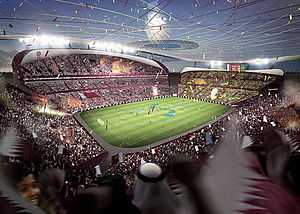Lusail Iconic Stadium
| Lusail Iconic Stadium | |
|---|---|
 Lusail National Stadium | |
| Location | Lusail, Qatar |
| Owner | Qatar Football Association |
| Surface | Grass |
| Architect | Foster + Partners |
| Capacity |
86,250 (planned) |
| Tenants | |
|
Qatar national football team 2022 FIFA World Cup | |
Lusail Iconic Stadium (Arabic: ملعب لوسيل الدولي) is a proposed football stadium which will be built in Lusail, Qatar in time for the finals of the 2022 FIFA World Cup.
The stadium will be used for the opening and final games of the 2022 FIFA World Cup. [1] Like the other stadiums planned for the 2022 World Cup, the Lusail Stadium will be cooled using solar power and have a zero carbon footprint.[2]
The stadium was designed by British firm, Foster + Partners.[1] It will have an almost circular base, surrounded by a moat and connected to the car park by six bridges.[1]
Building
The stadium has a near-circular footprint and sits on the masterplan’s primary axis, which divides the stadium precinct into two halves. Encircled by a reflective pool of water, spectators cross the ‘moat’ to enter the building via six bridges. An outer pedestrian concourse extends from the water towards an array of smaller amenity buildings and a hotel at the stadium’s perimeter.
The saddle-form roof appears to float above the concrete seating bowl, discreetly supported by a ring of arching columns. Its central section can be retracted to allow the pitch to be either open to the sky or fully covered. The concave profile of the stadium’s outer enclosure evokes the sails of a traditional dhow boat and incorporates a system of operable louvres. Inside, the seating bowl is designed to enhance the experience and atmosphere for spectators: VIP and hospitality accommodation is concentrated along the sides of the pitch to create a continuous sea of fans behind each goal.
Located in the centre of a new development to the north of Doha, with direct connections by road and a new metro line, Lusail Iconic Stadium is intended to be a catalyst for further growth and has a highly progressive environmental strategy. Parking and service areas are shaded by canopies of solar collectors, which will produce energy for the stadium when it is in use, as well as generating power for neighbouring buildings.[3]
HE Sheikh Mohammed bin Hamad bin Khalifa Al Thani, Chairman of the Qatar 2022 Bid, said:
- The Lusail Iconic Stadium will serve as the perfect venue for the opening and final matches of the World Cup. The stadium will inspire a new generation of regional and international sports venues, incorporating environmentally friendly cooling technologies to ensure the ideal conditions for players and spectators alike. The design of the stadium provides fans with optimum views of the action in a cool and comfortable setting. Its beauty and ambition represent the pride and enthusiasm that we have displayed in our bid thus far and will continue to display until the day FIFA awards the 2022 World Cup and beyond.
On 2 February 2011, it was announced that the stadium would be reconfigured into a 20,000 seat post-World Cup football stadium.
References
- ↑ 1.0 1.1 1.2 Administrator (2010-10-07). "Lusail Iconic Stadium, FIFA World Cup Stadiums Qatar, Building, Architect, Lusail Iconic Stadium Qatar". E-architect.co.uk. Retrieved 2012-02-22.
- ↑ "Qatar’s Lusail Iconic Stadium for Solar World Cup Stadium". Architecture View. 2010-10-27. Retrieved 2012-02-22.
- ↑ "Lusail Iconic Stadium for Qatar 2022 | Foster + Partners". plusMOOD. Retrieved 2012-02-22.
External links
| Preceded by Luzhniki Stadium Moscow |
FIFA World Cup Final Venue 2022 |
Succeeded by TBA |
| |||||